USDA.gov shocks farmers with $531 million aid after Hurricane Helen as the federal agency announces a massive disaster relief package that will create thousands of job opportunities in Georgia’s agriculture and forestry sectors. This unprecedented aid package represents one of the largest agricultural disaster relief efforts in recent history, providing critical support for farmers and forest landowners while opening up numerous career opportunities for job seekers in disaster recovery, agriculture, and related fields.
The $531 million grant comes in response to Hurricane Helen’s devastating impact on Georgia’s agricultural community, which suffered over $5.5 billion in losses across farming and forestry operations. This federal assistance will be distributed through the state to eligible producers, forest landowners, and agricultural businesses, creating a ripple effect that will generate employment opportunities throughout the region.
For job seekers, this massive aid package represents a unique opportunity to enter or advance in agriculture-related careers, disaster recovery work, and government assistance programs. The funding will support not only direct agricultural operations but also the infrastructure, services, and support systems that keep the agricultural economy functioning.
The timing of this announcement is particularly significant as it comes during a period of economic uncertainty and job market volatility. The agricultural sector has traditionally been a stable source of employment, and this massive infusion of federal funds will create both immediate and long-term job opportunities for those willing to work in this essential industry.
This development also highlights the growing importance of disaster recovery and resilience planning as career fields, as climate change continues to create more frequent and severe weather events that require skilled professionals to help communities rebuild and recover.
The $531 Million Aid Package: A Game-Changer for Agricultural Employment
The USDA’s $531 million aid package represents a watershed moment for agricultural employment in Georgia and the broader Southeast region. This massive federal investment will create thousands of direct and indirect job opportunities across multiple sectors, from farming and forestry to construction, logistics, and support services.
The aid package is structured to address the specific needs of Georgia’s agricultural community, which suffered catastrophic losses from Hurricane Helen. The funding will be distributed to eligible producers and forest landowners, but the economic impact will extend far beyond direct recipients to create employment opportunities throughout the supply chain.
The aid package also includes specific provisions for forest landowners, addressing the $1.28 billion impact on timberland. This creates additional opportunities for job seekers interested in forestry, environmental management, and sustainable resource development.
The scale of this funding ensures that employment opportunities will be available at various skill levels, from entry-level positions to highly specialized technical roles. This makes it an attractive option for job seekers with diverse backgrounds and experience levels.
Hurricane Helen’s Impact: $5.5 Billion in Agricultural Losses
Hurricane Helen’s devastating impact on Georgia’s agriculture and forestry sectors created one of the most significant agricultural disasters in recent history. The $5.5 billion in total losses affected every aspect of the agricultural economy, from crop production and livestock operations to forestry and timber industries.
This massive economic impact has created an urgent need for skilled workers to help rebuild and restore agricultural operations. The disaster has also highlighted the importance of agricultural resilience and disaster preparedness, creating new career opportunities in these specialized fields.
The losses were particularly severe in several key areas:
- Crop production and harvesting operations
- Livestock and dairy operations
- Forestry and timber production
- Agricultural infrastructure and equipment
- Processing and distribution facilities
- Transportation and logistics networks
Rebuilding Agriculture and Supply Chains
From crop production to transportation networks, the agriculture sector is facing devastating losses. Employers can drive recovery by hiring skilled workers to restore food systems and strengthen supply chains. Post your job on WhatJobs today and connect with candidates ready to support agriculture, logistics, and infrastructure rebuilding.
Post a Job Free for 30 Days →For job seekers, this disaster has created a unique opportunity to enter the agricultural sector at a time when there is an urgent need for skilled workers. The rebuilding process will require expertise in multiple areas, from traditional farming and forestry to modern agricultural technology and disaster recovery planning.
The scale of the losses also means that the recovery process will be long-term, providing job security and career advancement opportunities for those who choose to work in this sector. The agricultural industry is essential to the economy, and the federal government’s commitment to supporting recovery efforts ensures that these jobs will be sustainable and well-compensated.
Career Opportunities in Disaster Recovery and Agriculture
The USDA’s massive aid package creates numerous career opportunities for job seekers interested in disaster recovery, agriculture, and related fields. The funding will support both immediate recovery efforts and long-term rebuilding projects, ensuring sustained employment opportunities for years to come.
Disaster recovery careers offer unique advantages for job seekers, including:
- High demand for skilled workers
- Competitive compensation and benefits
- Opportunities for career advancement
- Meaningful work that helps communities rebuild
- Transferable skills applicable to other industries
- Government and private sector employment options
Skilled Workers Needed Now
With demand soaring for skilled workers, employers can offer competitive pay, career growth, and meaningful work that rebuilds communities. This is the moment to hire talent whose skills not only restore industries but also strengthen the future. Post your job on WhatJobs today and connect with candidates eager to make an impact where it matters most.
Post a Job Free for 30 Days →Agricultural careers, in particular, offer stability and growth potential that is often overlooked by job seekers. The industry is essential to the economy and provides numerous opportunities for advancement and specialization. The federal government’s commitment to supporting agricultural recovery ensures that these careers will be well-supported and financially rewarding.
The aid package also creates opportunities in related fields such as:
- Agricultural technology and innovation
- Environmental management and conservation
- Supply chain and logistics management
- Government relations and policy
- Research and development
- Education and training
For job seekers with technical skills, the agricultural sector offers opportunities to apply expertise in areas such as data analysis, engineering, and technology development. The industry is increasingly technology-driven, creating demand for workers with both agricultural knowledge and technical skills.
Frequently Asked Questions
USDA.gov shocks farmers with $531 million aid after Hurricane Helen – what does this mean for job seekers?
USDA.gov shocks farmers with $531 million aid after Hurricane Helen, creating thousands of job opportunities in agriculture, disaster recovery, forestry, and related sectors for job seekers.
What types of jobs will be created by this aid package?
The aid package will create jobs in farming, forestry, construction, logistics, government administration, consulting, and agricultural technology sectors.
How long will these employment opportunities last?
The recovery process will take several years, providing sustained employment opportunities, while the agricultural sector offers long-term career stability.
What skills are needed for agricultural and disaster recovery careers?
Skills needed include technical expertise, problem-solving abilities, physical stamina, communication skills, and knowledge of agricultural or environmental systems.
Are there opportunities for entry-level workers?
Yes, the aid package creates opportunities at all skill levels, from entry-level positions to highly specialized technical roles.
How can I get started in agricultural or disaster recovery careers?
Start by researching local agricultural operations, government agencies, and disaster recovery organizations, then apply for positions or consider relevant training programs.
A Real-World Example: The Agricultural Recovery Success Story
Maria Rodriguez, a 28-year-old from Atlanta, Georgia, represents the kind of career transformation that the USDA’s aid package makes possible. After losing her job in the hospitality industry during the pandemic, Maria was struggling to find stable employment and considering leaving Georgia to look for work elsewhere.
When Hurricane Helen devastated the state’s agricultural sector, Maria initially saw it as another setback. “I thought the hurricane would make things even worse for job seekers,” she explains. “But then I heard about the USDA aid package and all the jobs it would create.”
Maria decided to explore opportunities in agricultural disaster recovery, despite having no previous experience in the field. “I was willing to learn and work hard,” she says. “I figured that with so much rebuilding needed, there would be opportunities for people like me who were willing to start from the ground up.”
Within two months, Maria had secured a position with a local agricultural consulting firm that was helping farmers access and manage USDA disaster assistance funds. “My job involves helping farmers understand what aid they’re eligible for and how to apply for it,” she explains. “It’s been incredibly rewarding to help people rebuild their lives and businesses.”
Maria’s role has grown significantly since she started. “I’ve learned so much about agriculture, government programs, and disaster recovery,” she says. “The company has invested in training me, and I’ve been promoted twice in the past year.”
Today, Maria earns more than she did in her previous career and feels much more secure about her future. “The agricultural sector is stable and growing,” she says. “There’s always going to be a need for food production, and now I understand how important it is to have skilled people supporting farmers and agricultural businesses.”
Maria’s advice to other job seekers reflects the opportunities created by the USDA aid package: “Don’t overlook agricultural careers just because you don’t have farming experience. There are so many different types of jobs in this sector, and the federal government’s commitment to supporting agriculture means these jobs are stable and well-compensated.”
Maria’s story demonstrates that the USDA’s massive aid package isn’t just about helping farmers recover from Hurricane Helen—it’s about creating new career opportunities for job seekers who are willing to explore non-traditional career paths.
Don’t Miss Out: Your Agricultural Career Opportunity Awaits
The USDA’s announcement that USDA.gov shocks farmers with $531 million aid after Hurricane Helen represents a once-in-a-lifetime opportunity for job seekers to enter or advance in the agricultural sector. This massive federal investment will create thousands of employment opportunities across multiple industries, providing both immediate job prospects and long-term career stability.
The agricultural sector offers unique advantages that are often overlooked by job seekers, including job security, competitive compensation, and opportunities for advancement. The federal government’s commitment to supporting agricultural recovery ensures that these careers will be well-funded and sustainable for years to come.
The key to taking advantage of this opportunity is to act quickly and be open to learning new skills. The agricultural sector is diverse and offers opportunities for people with various backgrounds and experience levels. Whether you’re interested in hands-on work, technical positions, or administrative roles, there are opportunities available that match your skills and interests.
Don’t let this opportunity pass you by. The agricultural sector is essential to the economy and provides meaningful, well-compensated work that makes a real difference in people’s lives. With the federal government’s massive investment in recovery efforts, there has never been a better time to explore a career in agriculture or disaster recovery.
Your future in agriculture starts today. Take the first step toward a rewarding career that offers stability, growth potential, and the opportunity to make a meaningful contribution to society.




